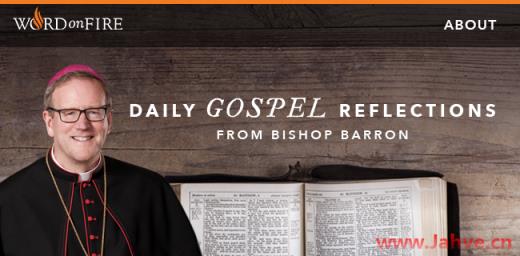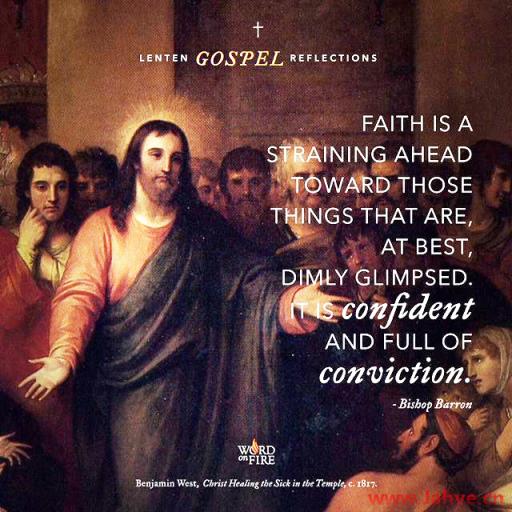 Bishop Barron翻译|Carrie2018-3-12
Bishop Barron翻译|Carrie2018-3-12 朋友们,今天的福音讲述耶稣治愈了一位王臣的儿子。这位王臣请求耶稣医治奄奄一息的儿子,祂回应道:“除非你们看到神迹和奇事,你们总是不信。”但王臣坚持请求,耶稣就对他说他的儿子活过来了。王臣信了耶稣,他的儿子随之恢复健康。神学家保罗·蒂利希说“信德”是宗教词汇中最被人误解的词语。这是个悲剧,因为信德是宗教的关键、是基督事务的必要条件。信德是什么?《希伯来书》第十一章的开端对信德作出了正确的定义:“信德是所希望之事的担保,是未见之事的确证。”信德是向着充其量只能说是模糊不清的前方撒腿奔驰。但注意,这种奔驰不是战战兢兢、束手无策、缺乏信心的,而是“担保”和充满“确证”的。想想那些充满信德的伟人,从亚巴郎到若望·保禄二世:他们毫不动摇、含糊、怀疑。就像今天福音中的王臣一样,他们沉着、明确、笃定。Friends, our Gospel today tells of Jesus healing a royal official’s son. The official asked him to heal his son, who was near death. Jesus said to him, "Unless you people see signs and wonders, you will not believe." But the royal official persisted. And Jesus told him his son would live. The man believed Jesus, and his son recovered.Theologian Paul Tillich said that "faith" is the most misunderstood word in the religious vocabulary. And this is a tragedy, for faith stands at the very heart of the program; it is the sine qua non of the Christian thing. What is it? The opening line of Hebrews 11 has the right definition: "Faith is confident assurance concerning what we hope for, and conviction about things we do not see."Faith is a straining ahead toward those things that are, at best, dimly glimpsed. But notice, please, that it is not a craven, hand-wringing, unsure business. It is "confident" and full of "conviction." Think of the great figures of faith, from Abraham to John Paul II: they are anything but shaky, indefinite, questioning people. Like the royal official, they are clear, focused, assured.
朋友们,今天的福音讲述耶稣治愈了一位王臣的儿子。这位王臣请求耶稣医治奄奄一息的儿子,祂回应道:“除非你们看到神迹和奇事,你们总是不信。”但王臣坚持请求,耶稣就对他说他的儿子活过来了。王臣信了耶稣,他的儿子随之恢复健康。神学家保罗·蒂利希说“信德”是宗教词汇中最被人误解的词语。这是个悲剧,因为信德是宗教的关键、是基督事务的必要条件。信德是什么?《希伯来书》第十一章的开端对信德作出了正确的定义:“信德是所希望之事的担保,是未见之事的确证。”信德是向着充其量只能说是模糊不清的前方撒腿奔驰。但注意,这种奔驰不是战战兢兢、束手无策、缺乏信心的,而是“担保”和充满“确证”的。想想那些充满信德的伟人,从亚巴郎到若望·保禄二世:他们毫不动摇、含糊、怀疑。就像今天福音中的王臣一样,他们沉着、明确、笃定。Friends, our Gospel today tells of Jesus healing a royal official’s son. The official asked him to heal his son, who was near death. Jesus said to him, "Unless you people see signs and wonders, you will not believe." But the royal official persisted. And Jesus told him his son would live. The man believed Jesus, and his son recovered.Theologian Paul Tillich said that "faith" is the most misunderstood word in the religious vocabulary. And this is a tragedy, for faith stands at the very heart of the program; it is the sine qua non of the Christian thing. What is it? The opening line of Hebrews 11 has the right definition: "Faith is confident assurance concerning what we hope for, and conviction about things we do not see."Faith is a straining ahead toward those things that are, at best, dimly glimpsed. But notice, please, that it is not a craven, hand-wringing, unsure business. It is "confident" and full of "conviction." Think of the great figures of faith, from Abraham to John Paul II: they are anything but shaky, indefinite, questioning people. Like the royal official, they are clear, focused, assured.

微信小程序
微信扫一扫体验

微信公众账号
微信扫一扫加关注
顶部
